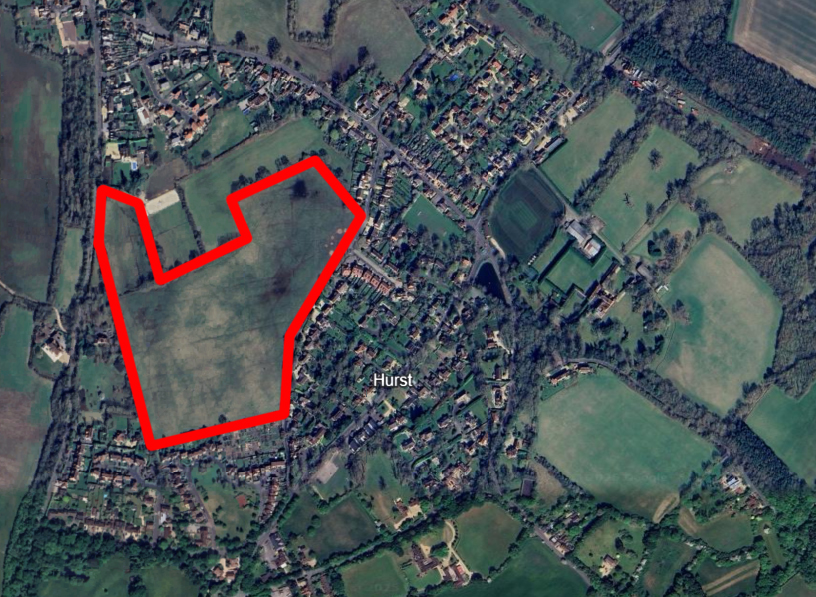

05:00PM, Tuesday 14 October 2025

The appeal site viewed from Tape Lane (image: Google).
Plans for 99 new homes in Hurst have been thrown out at appeal, with a planning inspector warning its ‘cumulative harms’ outweighed any benefits.
Developers Mactaggart and Mickel Strategic Land had applied to Wokingham Borough Council to build the homes on farmland between Lodge Road and Tape Lane in the village.
A public inquiry wrapped up last month after the local authority refused planning permission, fearing the site would be ‘significantly out of scale with the neighbouring small village of Hurst’.
Inspector Guy Davies has now ruled the appeal should be dismissed and said the ‘significant benefits’ of the scheme ‘do not outweigh the numerous problems identified during the inquiry.

The appeal site is highlighted in red (image: Google Earth/Maxar technologies).
The appeal site, an area of arable fields used for pony and horse grazing, is within the Hurst River Terrace region – a relatively flat rural area shaped by the meandering River Loddon.
Mr Davies’ report on the appeal focused on six aspects of potential harm.
These were: problems with the homes’ location; changes to the area’s character and appearance; infrastructure pressure; flood risk; impact on nature; and loss of agricultural land.
Issues with the plans were thrashed out at the public inquiry between August and September, where developers and the local authority set out their cases.
A letter submitted on behalf of the appellant as part of appeal proceedings said the plans were ‘both sustainable and help meet the economic needs of the area’.
It said the developers estimated approving the new homes would ‘support the employment of in excess of 300 people and generate over £1m in tax revenue’.
Wokingham Council’s submission countered that the appeal scheme ‘ignores the fundamental issues raised with locating a major residential development on this site’.
“Where the benefits have been reduced, but the harms remain substantial and enduring, the case for approval becomes even weaker.”
In a decision notice published on October 9, the planning inspector appointed to adjudicate on the case ruled the appeal should be dismissed.
‘The benefits of the scheme, significant though some of them are, do not outweigh the cumulative harms outlined,” the inspector said.
The inspector said the homes ‘would have a moderate adverse effect on the character and appearance of the landscape’ which ‘would persist’ after re-landscaping had been undertaken.
Although the inspector did not consider that the homes would cause ‘the loss or deterioration of irreplaceable habitats and would not harm the existing biodiversity value of the site’.
But fears were raised about whether the development would encourage less private car use, given its rural location and despite ‘significant’ improvements suggested by the developer.
The appeal site was ‘not readily accessible to services and facilities by sustainable means of transport,’ the inspector said, adding:
‘While the package of travel measures would be of benefit it would not increase accessibility to higher order services and facilities to the extent that would make it fully sustainable’.
The inspector also ruled against the developers’ bid for its appeal costs to be paid by the local authority.
Most read
Top Articles
Planned track closures are impacting trains to and from Maidenhead, Burnham and Taplow on the Elizabeth Line.
A killer who stabbed his victim dozens of times after a drug-deal gone wrong in Slough has been found guilty of murder by unanimous jury verdict.
Drivers on the M4 near Slough have been warned to expect nearly an hour of delays and up to three miles of traffic following a multi-vehicle crash.